Chapter 4 – the one where the first bear arrived
11 September 2015
A house is not a home until it’s lived in.
Opening a sanctuary in China for bears rescued from the bile trade had taken intensive negotiations, sleepless nights and major fundraising. But when Animals Asia established its first bear rescue centre in China in the year 2000, it's hard to imagine the nervousness of founder Jill Robinson and her team.
Because only bears can show you if a bear sanctuary is fit for purpose.
Imagine the mixed feelings when the first rescue truck arrived. Concern for the bear. Excitement at the start of a next chapter. Nervous for new steps being taken. Jill remembered:
“It was a cold October evening as the truck pulled up and backed into the entrance to the old hospital. We lifted up the tarpaulin and we saw three rusty ‘crush’ cages with still, black figures inside. As the tarpaulin was pulled back the two female bears suddenly exploded with fear and rage, growling and lashing out at anyone who came near.”
But, there was something different about the third bear in the cage. Apart from the fact Andrew – as he would come to be known - was male, Jill sensed something about him. Something similar to that very first feeling of pure calm when she first set foot in a bear bile farm and a bear reached out to gently hold her hand.
She continued:
“As soon as I set eyes on him, I knew he was special. Like the other bears, poor Andrew had spent years in agonising pain in a cage that was barely the size of a coffin. But while the two females either cowered in terror or thrashed around wildly in their cages, Andrew stayed calm. It was pandemonium, but in the middle of this horror there he was, lying on his back picking at the bits of metal holding his rusty cage together.
“We could also see that Andrew's front leg had been lost – suggesting he had been caught in the wild. Andrew astonished and moved us all with his calm and placid nature. It was as if he knew he was about to start a new life, and knew he was safe.”
Andrew was the first of more than 60 moon bears to arrive at the China sanctuary in October and November 2000. He and the two female bears – Melody and Gail – arrived a few weeks before a much larger group of bears.
At that time the Animals Asia welcome party was relatively small in number, comprising Jill Robinson, Annie Mather, the charity’s Media Director, who went on to become its Executive Director, and two of Animals Asia’s founding members, Gail Cochrane, Veterinary Director, and Boris Chiao, Project Director.
Also present were the two forestry workers, Howard Wang and Xiao Huang, who both later became full time employees, and Libby Halliday Palin, a BBC producer/director, and her cameraman David Peters, both of whom remain good friends of Jill’s to this day.
Jill said:
“I remember the arrival as if it were yesterday - feeling sick to my stomach anticipating seeing suffering, traumatised bears, but also a sense of relief at having the chance to finally remove their pain. As with all of our rescues, everyone involved deals differently with the new bears coming in. Some shed a few tears at the time, others are so busy in the heat of the moment doing their job that it hits them later, perhaps in a moment of quiet reflection after the bears have been settled in for the night.”
Jill remembered hoping the bears knew they were in a safe place, and could understand that no harm was to come to them. She certainly hoped so:
“How could they tell the difference between us and the farmers? How could they know that no one was ever going to hurt them again? It was heart breaking not being able to just release them, set them free from that awful iron prison. But we knew that things had to be taken slowly and that the bears would need to be nourished and examined over the next few days – after all, we had to ensure they could tolerate an anaesthetic and would be strong enough for the hours of surgery necessary to repair their broken bodies.”
The bears ate “fruit kebabs” - pieces of watermelon, pineapple, apple and banana on the ends of metal hooks. Feeding them this way kept the team far enough away from the cages and the unpredictable actions of what were still nervous, suspicious bears. Straw placed on top of the cages was pulled through by the bears allowing them to get comfortable and lie on something soft. Whilst their eyes still blinked with fear, their thirsts were quenched and their tummies were full. A nutritious, tasty and varied diet would, from this point on, be the norm.
A bear rescue is a lot less dramatic – a lot less Hollywood than people tend to imagine. There is no dramatic moment of release. The cage isn't suddenly open and the bear doesn't rush out. The reality takes a lot more patience. Jill explains:
“Our bears come to love the open space but it takes time for them to shed the memories of their past and to build trust with us as humans. All too often, their condition on arrival means there is little cause for celebration. Even before thinking about the next steps for Andrew, Melody and Gail, a six inch metal catheter embedded in their gall bladders had to be removed. These instruments for extracting bile are still seen on Chinese bear farms today, despite the fact they’re against regulations.
“Andrew's abdomen was a disgrace, with lots of visible scar tissue. Years of attempting to bite from his cage had left him with broken teeth which had to be removed.”
Fortunately, Andrew's surgery went smoothly and he could spend the next few weeks recovering. As other bears arrived after Andrew, thoughts turned to their integration. After several weeks and months of carefully chaperoned introductions, there was a community of 24 moon bear friends in one enclosure. They included Jasper, Freedom, Bonnie, Prince, Ginny, Frank, Beau, Douglas and Pooh - all of whom are alive and well to this day.
Alas, Andrew is no longer at the centre – he died in February 2006. He had enjoyed six years of freedom and happiness before his death.
“He was our gentle giant and went on to be the ‘uncle’ of all the other bears - patiently tolerating the younger mischievous juveniles leaping all over him, or wrestling good naturedly with the more mature boys. So handsome was he that we loved to call him the ‘Brad Pitt’ of the bear world. The female bears were always utterly comfortable in his presence and many, like Freedom, unashamedly adored him, flirting in his presence at every opportunity. We adored him too.“
“It turned out that Andrew wasn't the easiest name for Chinese staff like Howard to pronounce so he was alternatively known as ‘Anderloo’. Sadly, after 14 years with Animals Asia, Howard returned to the Forestry Department last year together with the other forestry staff we had on site. It was sad to see them go, but they were given a higher-ranking government opportunity that was too good to miss. Their years of service to Animals Asia has served them well and they took with them not just our best wishes and thanks but also a deep understanding of animal welfare.
“Over the years that followed, Andrew flourished, and became hugely popular with visitors and the media as his reputation for being such a gentle, happy bear grew. Thoroughly spoiled, he got away with so much more than the other bears - for example if a bear was slow to return to the den at night or was seen sleeping underneath the stars, we knew it was Andrew. But we left him alone knowing that he would eventually amble back in his own good time. He taught us so much about this intelligent, forgiving species and in doing so, captured the hearts of everyone he met.”
While the loss of any bear is sad, Andrew’s demise was particularly poignant, having been the first bear to officially take up residence at the rescue centre. Jill recounted those final days:
“He'd clearly been going downhill; sleeping more, eating less and just not seeming himself. We took him over to the hospital so our vets could begin exploratory surgery the next day to find out what was plaguing him. That night I crept into the room next to the surgery and offered him some food. He ate more than he'd eaten the entire week leading up to that, his mouth pursing for another slice of tomato, another tub of yoghurt and an extra special treat of a blueberry muffin - causing me to wonder if he was really as sick as we had earlier thought. But at one point he held my eyes with his and gave a soft but forceful "woof". It was something he'd never done before and I knew in that moment I would never see him alive again.”
The next day’s surgery yielded a grim discovery – an aggressive tumour had completely overtaken Andrew’s organs. His liver was so badly affected the vet team surmised it had just 5% of its normal function. There was simply no other option, and no better act of mercy, than for staff to say their goodbyes.
The removed tumour weighed an astonishing 7.3kg, surpassing anything the Animals Asia team had seen before. Many bears die from liver cancer, the likely result of cell damage from surgical mutilation and infection from repeated bile extraction on the farms.
Jill added:
“It was a silent demon left behind from years of bile extraction. It caught up with him in the end.”
Today’s medicine is more advanced - ultrasound and x-ray machines can detect cancer and other issues at an earlier stage than was possible then. But the fight to stop the root cause – the practice of bear bile farming – is still Animals Asia’s fundamental aim.
Jill said:
“No words can explain our grief. We cremated and buried our mighty Andrew with local TV cameras and the San Francisco Chronicle recording this milestone chapter in bear farming history. There was an outpouring of anger and sadness from Chinese and Western staff alike which is difficult to describe even now, but which united everyone with that conviction and determination that Andrew would not die in vain.
“I’ll never forget the words of a supporter from the UK, named, David, who wrote 'You are not weaker without Andrew, you are stronger because of him'. And we are.”
BACK

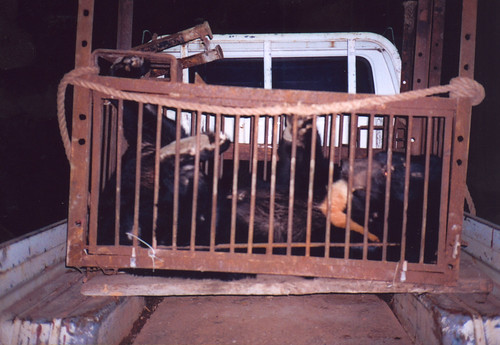
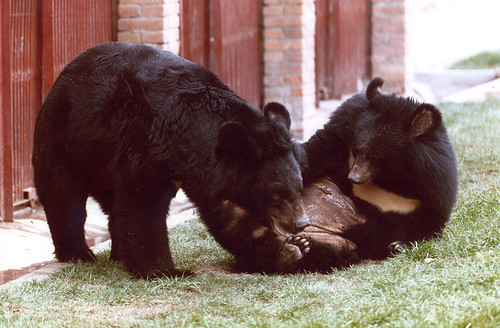
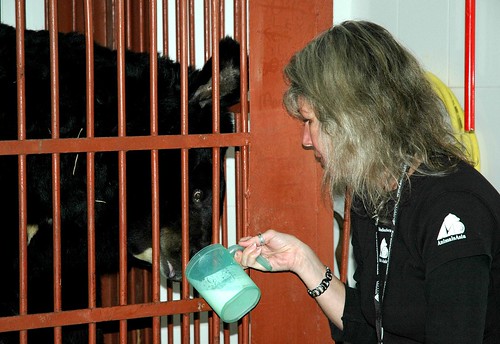
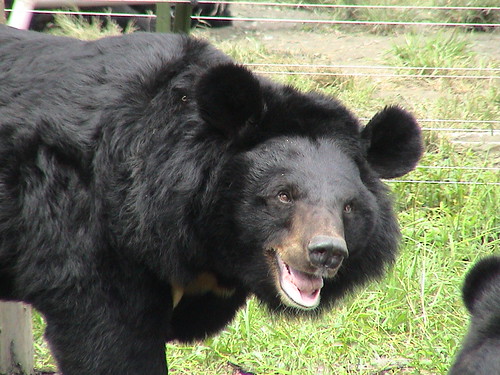

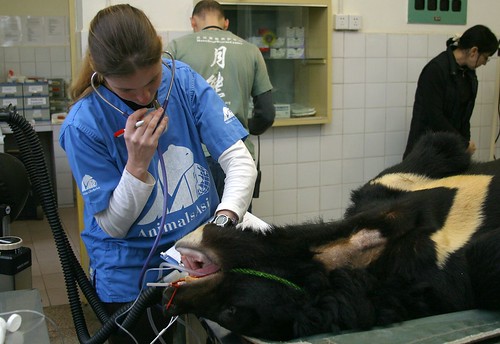
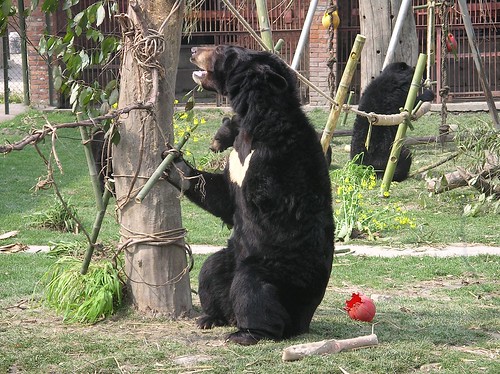
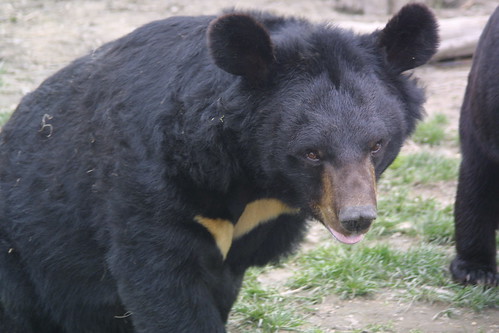
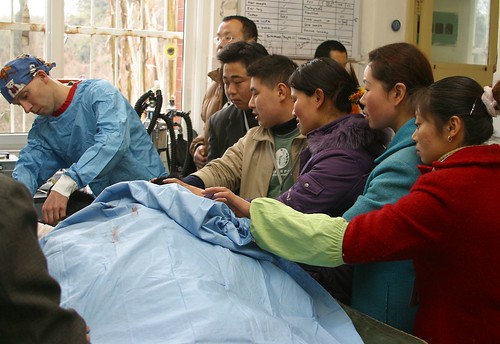
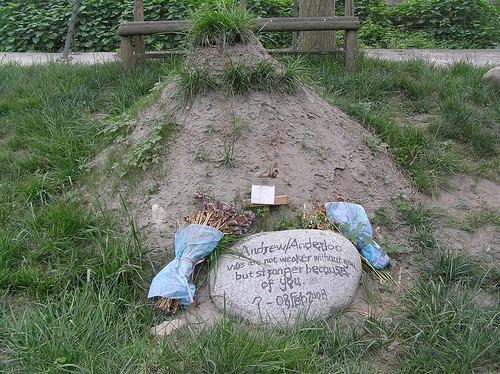
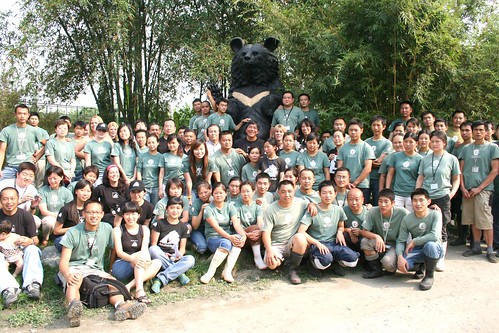





 Freedom after two decades: Moon bears Nang and Mua rescued
Freedom after two decades: Moon bears Nang and Mua rescued
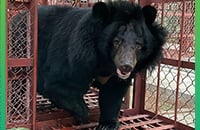 With heavy hearts we say goodbye to our beloved Tulip
With heavy hearts we say goodbye to our beloved Tulip
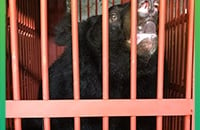 Three moon bears rescued from notorious bear bile farming hotspots in Vietnam
Three moon bears rescued from notorious bear bile farming hotspots in Vietnam